Here’s a few examples of the wonderful “Come on, Steve” strip, and a tribute to the strip’s creator, Roland Davies. Davies drew for the strip for both the Sunday Express and the Sunday Dispatch and I loved reading the stories as a kid, which appeared in annuals owned, presumably, by my Mum as a child, which my grandparents had kept and I read on visits to see them.
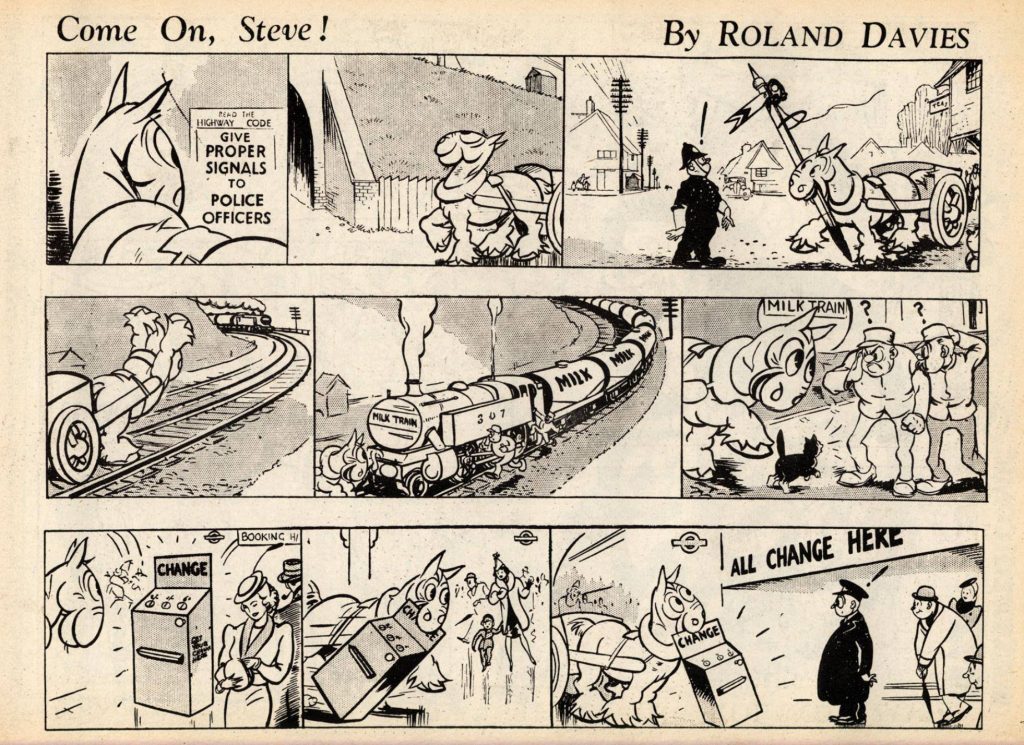
“Come on Steve” was the creation of Roland Davies, whose long career covered sports cartoons, topical cartoons, strip cartoons, animated cartoons, children’s books and boys’ weeklies, and as noted in his obituary by Denis Gifford, superb paintings which were sold in art galleries to collectors who never knew of his once famous comic horse.
Born 23rd July 1904 at Stourport, Worcestershire, Davies studied at Ipswich School of Art, taking part time evening classes for two years, then two years full time. Apprenticed as a lithographer in West Drayton for four years, he produced a number of cinema posters, then became a freelance illustrator, drawing cartoons for magazines such as Autocar and Motor Cycle.
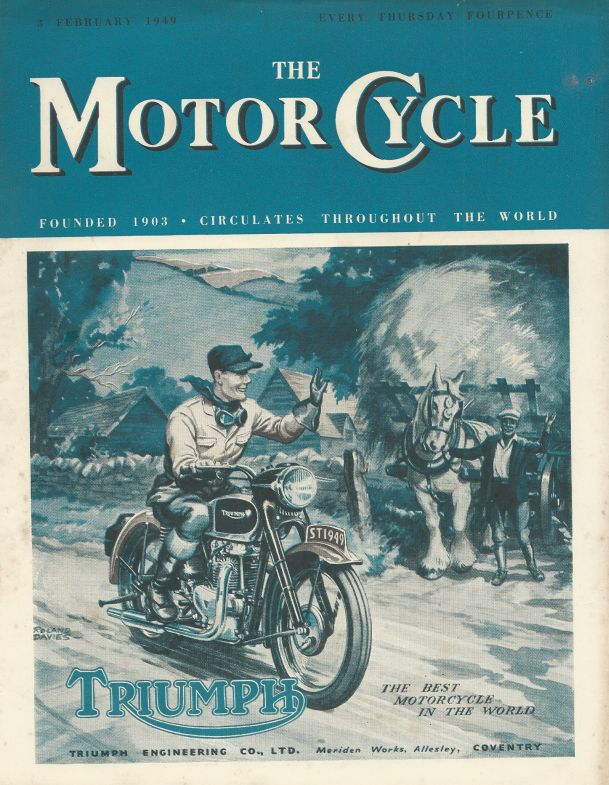
A cover for “The Motor Cycle” by Roland Davies
By 1928, he was drawing illustrations and covers for the magazine Modern Boy, before getting his big break in March 1932, when he began drawing “Come On Steve” for the Sunday Express. This title came from the cries of the race-going crowd as jockey Steve Donoghue rode to victory after victory.
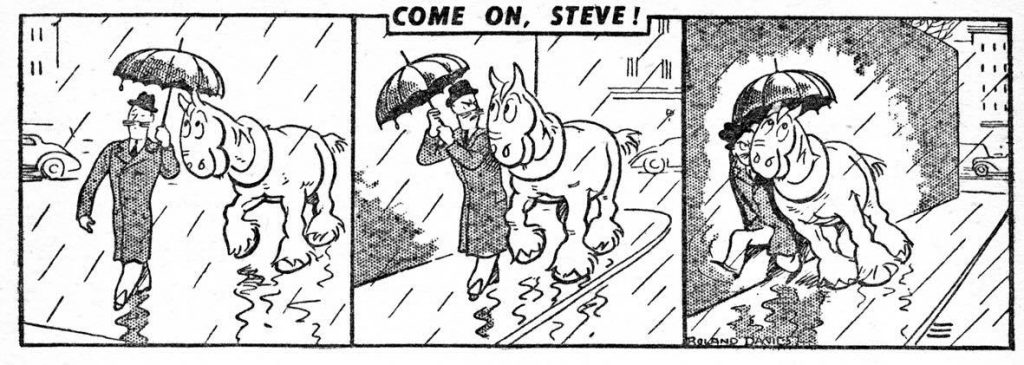
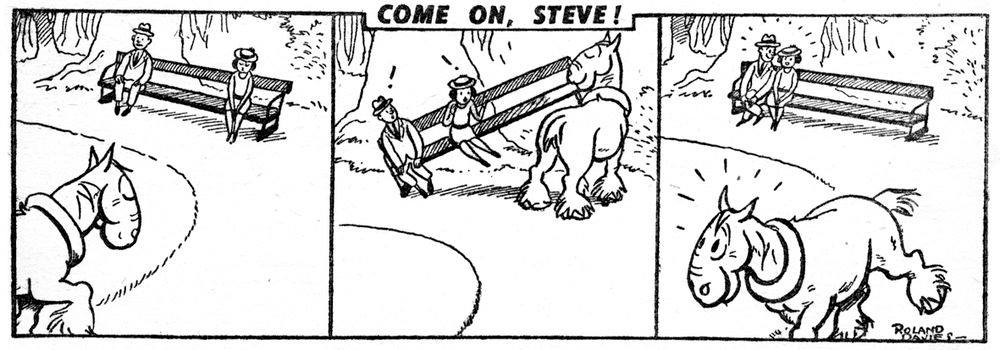 Davies retained copyright on the character, which was hugely popular, including overseas, where it was syndicated to newspapers such as The Argus in Australia. He sunk his savings into an eighteen shilling (90p) stop-frame cine camera, set up a studio in his kitchen and spent seven months making a short animated cartoon film. Once a soundtrack had been added, he persuaded Butcher’s (a distributor of cinema ‘B’ pictures) to give him a contract for six eight minute cartoons at £800 each.
Davies retained copyright on the character, which was hugely popular, including overseas, where it was syndicated to newspapers such as The Argus in Australia. He sunk his savings into an eighteen shilling (90p) stop-frame cine camera, set up a studio in his kitchen and spent seven months making a short animated cartoon film. Once a soundtrack had been added, he persuaded Butcher’s (a distributor of cinema ‘B’ pictures) to give him a contract for six eight minute cartoons at £800 each.
Davies then launched his own cartoon film company, Cartoon Films Limited, based in Museum Street, Ipswich with finance from his father-in-law, staffed mainly by students from the Art School.
Six cartoon films for the cinema were made during 1936 and 1937, plus an advertising film for Ford Tractors, adapting the strip about the adventures of Steve the Horse and his rider: Steve Steps Out, Steve’s Treasure Hunt, Steve’s Cannon Crackers, Steve of the River, Steve in Bohemia and Cinderella Steve. A further film, Steve Goes to London, to be produced in colour, was planned but never appeared.
Carl Giles, later to become known for his one-frame cartoons for Express newspapers, worked on the films as an animator with Davies as producer and director. Giles would go on to make three of propaganda films during the war, noted here on the Lost Continent site devoted to the art and history of British animation.
In addition to Steve in Bohemia, the East Anglian Film Archive contains Come On Steve! – possibly a short pilot that was never commercially released.
“Come on, Steve!” continued in the Sunday Express until 1939, moving to the Sunday Dispatch when they dropped it. Roland Davies was given the post of cartoonist at the Dispatch, and added topical comments in cartoons under the name of ‘Rod’.
In the late 1930s, Davies also worked for DC Thomson on and early issues of The Beano, drawing “Contrary Mary the Moke”, “Whoopee Hank, the Slapdash Sheriff” and “Boney the Brave, he Lives in a Cave”; for the short-lived The Magic Comic, he drew “Bandy Legs” in 1940 and and “Tough Nellie Duff” for The Magic Beano Book for 1941.
During this time, he also worked for DC Thomson’s rivals Amalgamated Press, drawing “Gummy” and “Charlie Chasem” for Knock-Out.
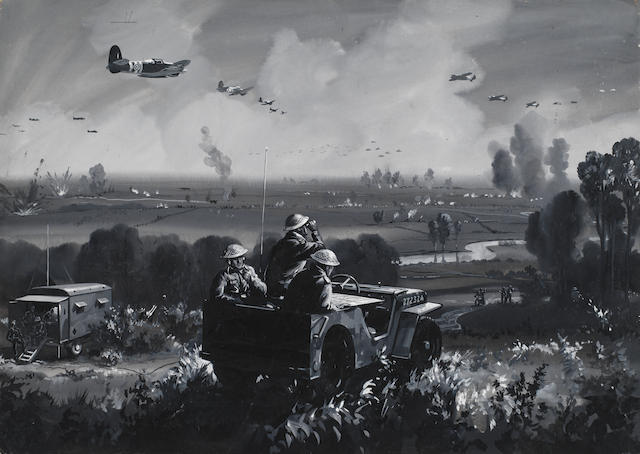
“How the Air Arm assists the Land Forces in the Normandy battle Zone.” by Roland Davies published in The Sphere No. 2322, cover dated 22nd June 1944. Auctioned by Bonhams in 2014, it is probably based on a photograph, showing the RAF and US Army cooperating in directing fighters onto German targets on the Normandy plain.
During World War Two, Davies’ realistic genre of comic design and early automotive interests were used at the Ministry of Information, noted here The National Archives’ web site, where he produced a number of illustrated posters. He also worked on illustrations for a magazine called The Sphere, a weekly illustrated news magazine similar to the Illustrated London News.
After the war, he took over drawing “Teddy Tail” in the Daily Mail and moved into children’s books illustration, which included a number of Come On Steve annuals.
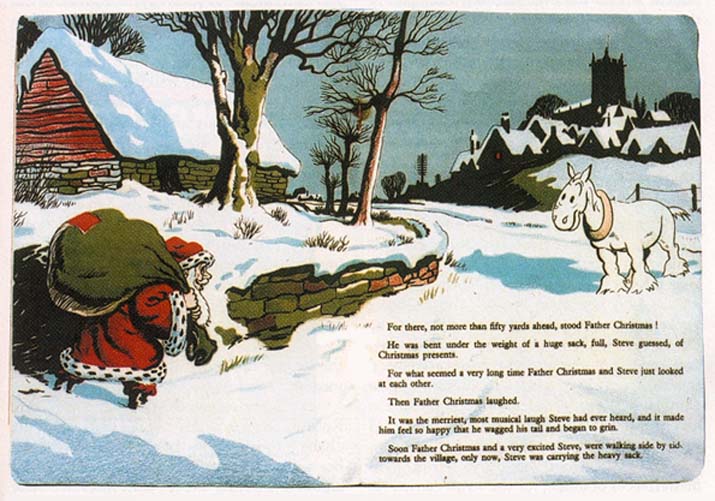
A double-page spread from the 1947 book ‘Steve’s Christmas Holiday’ by Roland Davies (as reproduced by Ashford & Wright in Book & Magazine Collector no.237). With thanks to Phil Rushton
When Come on Steve ended in 1949, he drew “Old Phibber“, a tall-tale-teller in the Wild West, for Knock-Out, and “Sparks and Flash“, a strip about a cartoon racing car, for Sun. It was editor Leonard Matthews who persuaded him to start drawing adventure strips as well as humour stories and he drew “Sexton Blake” from 1949 to 1952, and “Ambush“, an adaptation of the Robert Taylor western film. Unusually, his strips include his signature.
As we’ve previously noted, in comics, he’s credited as the artist on TV Comic‘s “Beetle Bailey” from 1965, but as well as work early in his career for Beano and The Magic Comic, his other comics work included “Jill Crusoe” for School Friend (1950 to 1959); from 1952 onwards, strips such as “Norman and Henry Bones“, “Jack and His Baby Jet“, “Snowfire“, “Dixon of Dock Green” and “Red Ray, Space Ranger” for TV Comic; “Send for Sally“and “What’s Cooking?” for Girl; and “Wyatt Earp” and the humour strips “The Topple Twins” and “Roddy the Road Scout” for Swift.
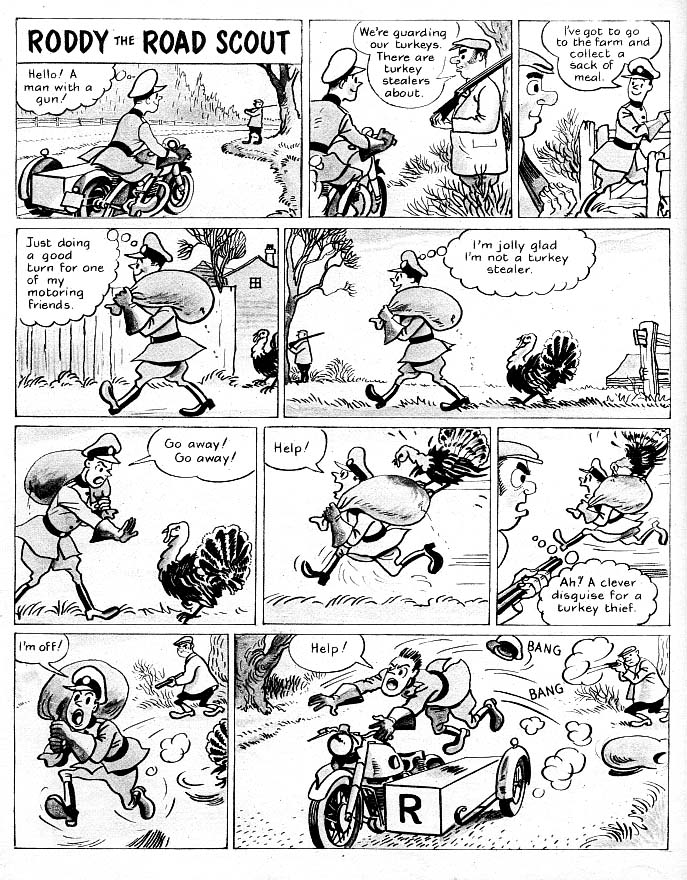
“Roddy the Road Scout” for Swift, by Roland Davies
His many credits also include three strips for the 1956 Riders of the Range annual, the 1957 Roy Rogers Adventures book; “Pedro” a strip for young readers for Woman’s Realm, and work for Robin and Princess.
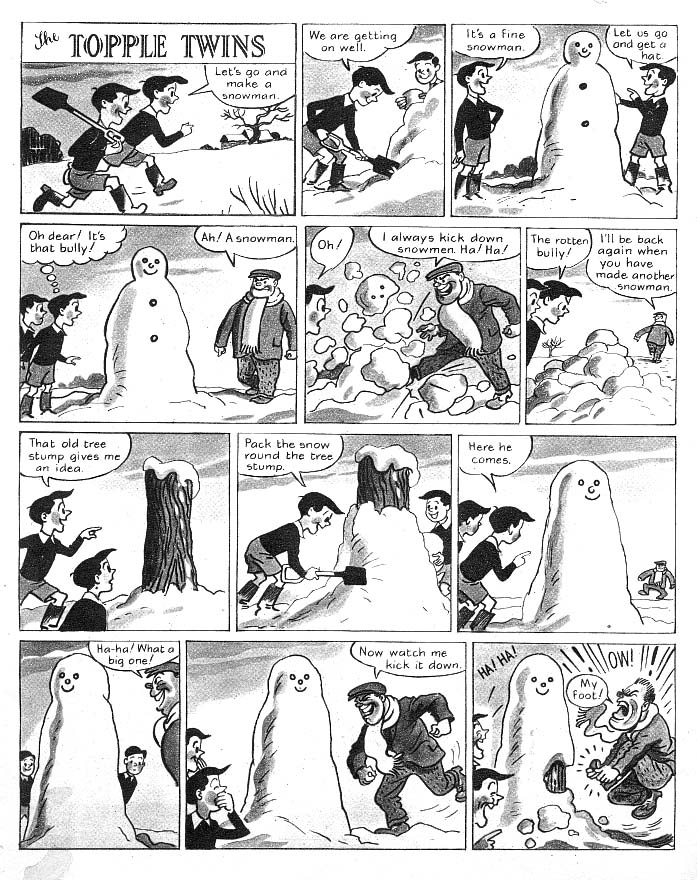
The Topple Twins by Roland Davies, for Swift
Davies was a highly skilled artist, able to adopt any style, and downthetubes contributor, the late Roger Perry, regarded him as one of the most versatile artists in the business, a talent which came to the fore with the New Adventures of Huck Finn storybooks published by Century 21 Publishing, where he had a realistic style for the live cast, and the rest as the Hanna-Barbara cartoon style.
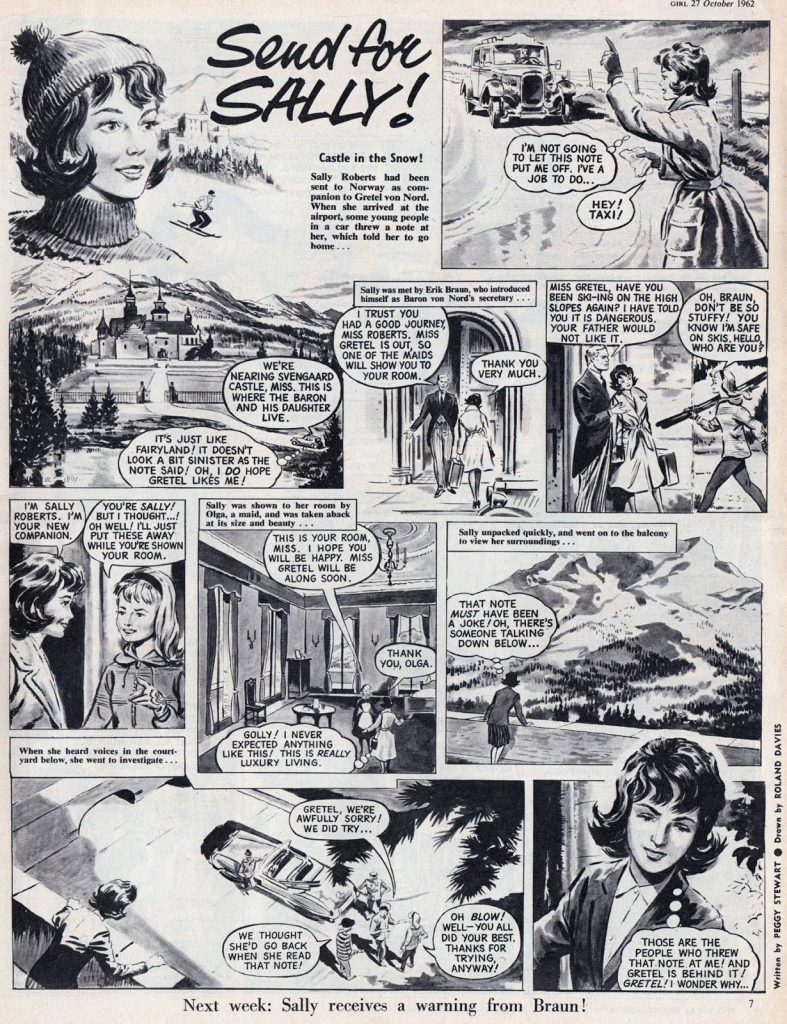
“Send for Sally!” written by Peggy Stuart, art by Roland Davies. With thanks to Lew Stringer
Davies continued drawing series for comics until the 1970s, including Disneyland, drawing “Peter Pan“, “Winnie the Pooh” and “The Jungle Book“, and strips for The Victor.
He then left this field and began oil painting. With guidance from art dealer and comics publisher Alan Class, he produced dramatic seascapes and colourful Parisian street scenes which appeared in many art galleries.
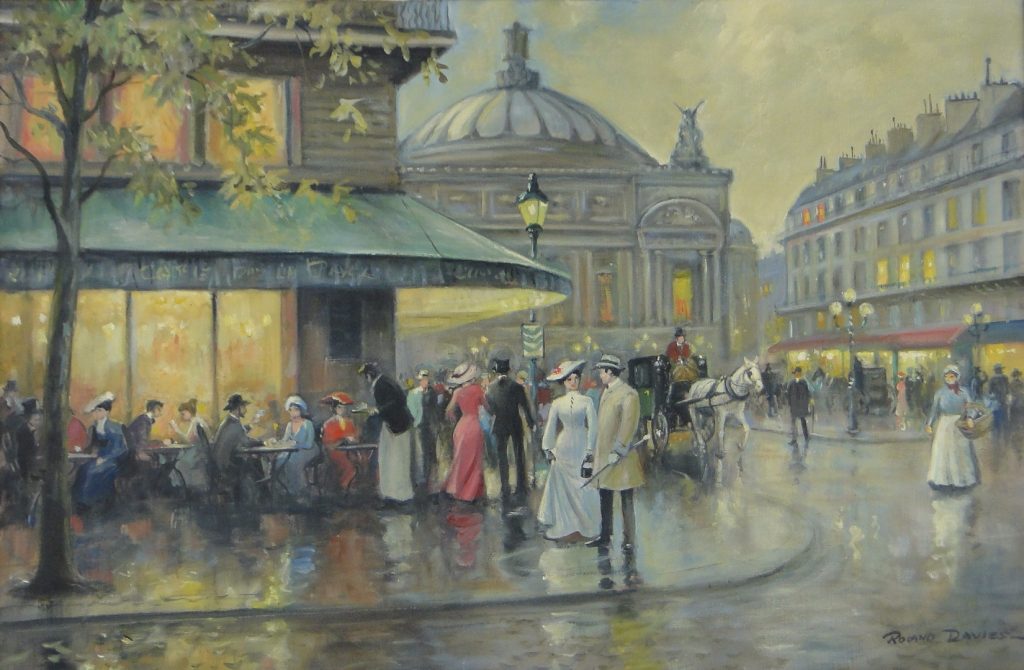
Opera Square, painting by Roland Davies
Roland Davies died on 12th December 1993. In Denis Gifford’s obituary for the Independent, he is described as “the epitome of the commercial artist, never happy unless he was drawing or painting”. A fine summation about a magnificent artist.
• Lambiek: Roland Davies | Obituary, 1993 in The Independent by Denis Gifford
• Bear Alley: Roland Davies Profile | The Lesser Known Art of Roland Davies by Gordon Howsden (Steve Holland has featured Davies art over on Bear Alley many times)
• National Archive: Roland Davies
With thanks to Jeremy Briggs, Phil Rushton, Lew Stringer and John Weeks
The founder of downthetubes, which he established in 1998. John works as a comics and magazine editor, writer, and on promotional work for the Lakes International Comic Art Festival. He is currently editor of Star Trek Explorer, published by Titan – his third tour of duty on the title originally titled Star Trek Magazine.
Working in British comics publishing since the 1980s, his credits include editor of titles such as Doctor Who Magazine, Babylon 5 Magazine, and more. He also edited the comics anthology STRIP Magazine and edited several audio comics for ROK Comics. He has also edited several comic collections, including volumes of “Charley’s War” and “Dan Dare”.
He’s the writer of “Pilgrim: Secrets and Lies” for B7 Comics; “Crucible”, a creator-owned project with 2000AD artist Smuzz; and “Death Duty” and “Skow Dogs” with Dave Hailwood.
Categories: Comic Creator Spotlight, Creating Comics, downthetubes Comics News, downthetubes News, Features
 Remembering Jon Haward: A Tribute by Tim Perkins
Remembering Jon Haward: A Tribute by Tim Perkins  Catching up with the Comics Laureate! An interview with Bobby Joseph
Catching up with the Comics Laureate! An interview with Bobby Joseph  Comic Creator Spotlight: An Interview with Commando and Doctor Who writer Rossa McPhillips MBE
Comic Creator Spotlight: An Interview with Commando and Doctor Who writer Rossa McPhillips MBE  Creating Comics: Artist PJ Holden takes us behind the scenes on Garth Ennis’ new war comic, The Lion and the Eagle
Creating Comics: Artist PJ Holden takes us behind the scenes on Garth Ennis’ new war comic, The Lion and the Eagle